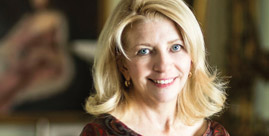
Cathy Russell
Ambassador-at-Large for Global Women’s Issues, US Department of State
It’s a strange thing to drive down the dusty roads of Khartoum in the afternoon and see stack after stack of plastic chairs sitting just feet away from the highway, seemingly abandoned. But as the sun and the temperature slowly drop, the scene changes quickly as the “tea ladies” appear, pulling down chairs, brewing tea, and preparing for customers.
Awadeya Mahmoud is, in many ways, a typical tea lady in Sudan. Now in her 50s, she started selling tea on the roadside to support her family. But she is extraordinary in that she has led a movement of other tea ladies demanding their rights.
Impoverished, internally displaced, and stuck in the informal sector of the economy, these tea sellers face tremendous barriers. They may be chased away from their stands. Their equipment is often confiscated. They’re asked to pay bribes to continue operating their stands.
After experiencing many of these barriers firsthand, Awadeya started a movement that grew into more than 7,000 women in three cooperatives, which have become a place for women to find support and learn how to navigate a male-dominated, oppressive society.
Awadeya is the epitome of a leader—so much so that the State Department honored her with the Secretary of State’s International Women of Courage Award1 in 2016—and a prime example of why older women must not be overlooked.
This magazine has documented the many challenges facing older women around the world, from poverty and legal barriers to discrimination and violence. To make matters worse, women over 50 have often been left out —of data collection efforts, of conversations about human rights, and of plans and programs to advance the status of women around the world.
As Ambassador-at-Large for Global Women’s Issues, I’ve spent the past three years working to ensure that women at every stage of life are included in US foreign policy and development efforts. My work has built on the US government’s commitment to gender equality and to our strong belief that when women do better, countries do better as well.
Earlier this year, the State Department released a strategy2 that acts as a road map for US diplomats to support women in job creation and development around the world, which has been one of our key priorities.
This economic empowerment strategy looks at issues like access to resources and decent work, barriers facing women entrepreneurs, and other cross-cutting issues that keep women from participating in the economy, such as gender-based violence.
The strategy also makes clear that, in order to succeed, we need to use all of our talent, including women of all ages. Our efforts should not leave older women behind as we all work to increase prosperity and stability for nations and communities across the globe.
As women grow older, any marginalization they’ve faced often grows with them. Poverty worsens. Isolation increases. Stereotypes and biases harden.
The good news is that there is growing recognition of the valuable contributions women of all ages have to offer economies. Increasing women’s economic participation at every phase of their lives strengthens prospects for economic growth. And it’s critical to breaking the cycle of poverty for families and preventing financial vulnerability in older age.
For much of the world, the question is no longer about why we should include women; it’s about how to do it. As we collect and analyze data, pilot programs, and implement policies, we must make sure that older women are not left behind. The Awadeyas of the world are doing their part, and they deserve better from us.
1 http://www.state.gov/s/gwi/programs/iwoc/
2 http://www.state.gov/s/gwi/econ/strategy/index.htm
About the author
As the US Ambassador-at-Large for Global Women’s Issues, Cathy Russell has led the State Department’s efforts to advance gender equality and the empowerment of women and girls around the world since 2013. In this role, she has focused on addressing gender-based violence, promoting women’s full participation in society, investing in adolescent girls, and integrating women’s issues into US foreign policy.